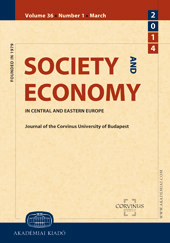Economic Policy Implications of External Debt and Capital Flight in Sub-Saharan Africa's Heavily Indebted Poor Countries
Economic Policy Implications of External Debt and Capital Flight in Sub-Saharan Africa's Heavily Indebted Poor Countries
Author(s): Isaac Kwesi Ampah, Gábor Dávid KissSubject(s): National Economy, Socio-Economic Research
Published by: Akadémiai Kiadó
Keywords: Heavily Indebted Poor Countries (HIPC); external debt; capital flight; Panel-Corrected Standard Error (PCSE); fiscal and monetary policies
Summary/Abstract: The paper analyses the impact of the simultaneous occurrence of external debt and capital flight on economic policy effectiveness in Heavily Indebted Poor Countries (HIPCs) in sub-Saharan Africa, employing the Panel-Corrected Standard Error regression model for the period 1990 to 2015. The empirical results reveal that both monetary and fiscal policies in the region had been undermined in achieving their intended purposes because of increasing capital flight and external debt. Also, the concurrent occurrence of capital flight and external debt has been a hindrance to progress on the continent, particularly by undermining domestic investment. These results call for more practical measures in addressing the issues of foreign debt and capital flight, given the critical importance of domestic private investment for both short- and long-run growth.
Journal: Society and Economy. In Central and Eastern Europe ǀ Journal of the Corvinus University of Budapest
- Issue Year: 41/2019
- Issue No: 4
- Page Range: 523-542
- Page Count: 20
- Language: English

